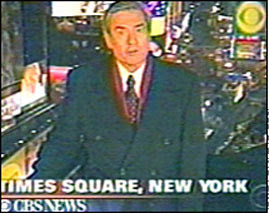
I chose this picture because it is an example of how media manipulation can reach the general public at anytime, and exposes it as a common practice. This is a picture from a New Year's Eve report on CBS, which aired in December 2000. It seems completely natural, depicting a typical New Year's celebration in Times Square. However, it has been revealed that the CBS emblem in the background was originally the NBC logo. The logo in the background was changed because the show was aired on CBS news, and they wanted to promote their own station, not NBC, their competitor. I don't think that the manipulation is as harmful as it is disconcerting. With this technology it is easy for businesses and companies to promote themselves by manipulating a lot of the broadcasting that reaches the public. This makes it difficult to know what of what we are viewing is actually real, or whether it is merely a ploy by these companies. Everything, even the news, has become an outlet for advertisement.

